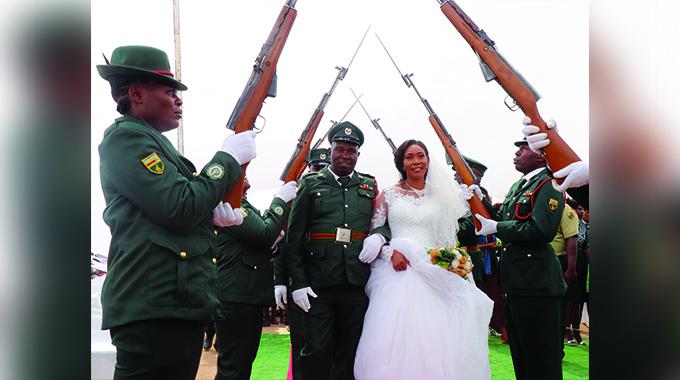News / National
Military wedding sets Bulawayo alight
29 Sep 2024 at 10:18hrs |
0 Views

The sight of Zimbabwe National Army (ZNA) personnel marching through the streets of Bulawayo yesterday stirred memories of the Covid-19 era when their presence dominated the city's landscape. However, this time, it was a different kind of gathering - one filled with romance, jubilation, and tradition, as the military celebrated a special wedding ceremony.
Senior Warrant Officer Class 2 (WO2) Jaffias Mauswa and his bride, Knowledge Tapera, tied the knot in a ceremony that beautifully intertwined military customs with personal vows, creating a unique celebration of love and service. The procession, filled with the rhythmic beats of military drums, began at the Large City Hall and moved through Bulawayo Centre, where shuttles transported guests to Zaoga Church in Lobengula for the continuation of the festivities.
The wedding reflected the precision, discipline, and sense of patriotism characteristic of military ceremonies, setting it apart from traditional civilian nuptials. Five distinct military traditions marked the day: the role of the officiating officer, the display of swords and bayonets, the bridal team, the cake-cutting ritual, and the presence of ark guards.
At military weddings, the officiating officer plays a pivotal role, acting as a bridge between the couple and the military hierarchy. Their attendance underscores the couple's dual commitment to their union and their service to the nation. In this case, Pastor Bonginkosi Dube, Senior Chaplain of the Bulawayo District stationed at Imbizo Barracks, officiated the ceremony and described the experience as an enlightening display of the ZNA's lesser-known side.
The use of swords and SKS bayonets is a hallmark of military weddings, symbolising loyalty and commitment. Commissioned officers wield swords, while non-commissioned officers present bayonets, emphasising the discipline and dedication to duty that define the military ethos. During the ceremony, ark guards stood watch over the proceedings, escorting the couple's vehicles and symbolising the protection and blessings of the nation.
One of the most memorable moments came during the cake-cutting ritual. In military weddings, the bride cleans the ceremonial bayonet used to cut the cake, symbolising her commitment to maintaining the soldier's high standards of excellence and discipline.
Reflecting on the wedding, Snr Chaplain Dube explained that military weddings are distinct from civilian ones, with protocols around dress code, weapons display, and formal movement orders adding to their unique character. "For one to have a military wedding, at least one partner must be in uniform. This could be a man or a woman, but military representation is essential," he said.
He also noted that the army's role extends beyond combat, highlighting community initiatives such as Silverton Interim Assistance, which demonstrate the ZNA's commitment to community development.
As the celebrations drew to a close, it was clear that military weddings are not only about the union of two people but also about celebrating love, discipline, and service to the nation. The procession through Bulawayo's streets reminded all present that, for those in uniform, dedication to both love and country are intertwined in a shared journey of service and sacrifice.
Senior Warrant Officer Class 2 (WO2) Jaffias Mauswa and his bride, Knowledge Tapera, tied the knot in a ceremony that beautifully intertwined military customs with personal vows, creating a unique celebration of love and service. The procession, filled with the rhythmic beats of military drums, began at the Large City Hall and moved through Bulawayo Centre, where shuttles transported guests to Zaoga Church in Lobengula for the continuation of the festivities.
The wedding reflected the precision, discipline, and sense of patriotism characteristic of military ceremonies, setting it apart from traditional civilian nuptials. Five distinct military traditions marked the day: the role of the officiating officer, the display of swords and bayonets, the bridal team, the cake-cutting ritual, and the presence of ark guards.
At military weddings, the officiating officer plays a pivotal role, acting as a bridge between the couple and the military hierarchy. Their attendance underscores the couple's dual commitment to their union and their service to the nation. In this case, Pastor Bonginkosi Dube, Senior Chaplain of the Bulawayo District stationed at Imbizo Barracks, officiated the ceremony and described the experience as an enlightening display of the ZNA's lesser-known side.
The use of swords and SKS bayonets is a hallmark of military weddings, symbolising loyalty and commitment. Commissioned officers wield swords, while non-commissioned officers present bayonets, emphasising the discipline and dedication to duty that define the military ethos. During the ceremony, ark guards stood watch over the proceedings, escorting the couple's vehicles and symbolising the protection and blessings of the nation.
One of the most memorable moments came during the cake-cutting ritual. In military weddings, the bride cleans the ceremonial bayonet used to cut the cake, symbolising her commitment to maintaining the soldier's high standards of excellence and discipline.
Reflecting on the wedding, Snr Chaplain Dube explained that military weddings are distinct from civilian ones, with protocols around dress code, weapons display, and formal movement orders adding to their unique character. "For one to have a military wedding, at least one partner must be in uniform. This could be a man or a woman, but military representation is essential," he said.
He also noted that the army's role extends beyond combat, highlighting community initiatives such as Silverton Interim Assistance, which demonstrate the ZNA's commitment to community development.
As the celebrations drew to a close, it was clear that military weddings are not only about the union of two people but also about celebrating love, discipline, and service to the nation. The procession through Bulawayo's streets reminded all present that, for those in uniform, dedication to both love and country are intertwined in a shared journey of service and sacrifice.
Source - The Sunday News
Join the discussion
Loading comments…


































